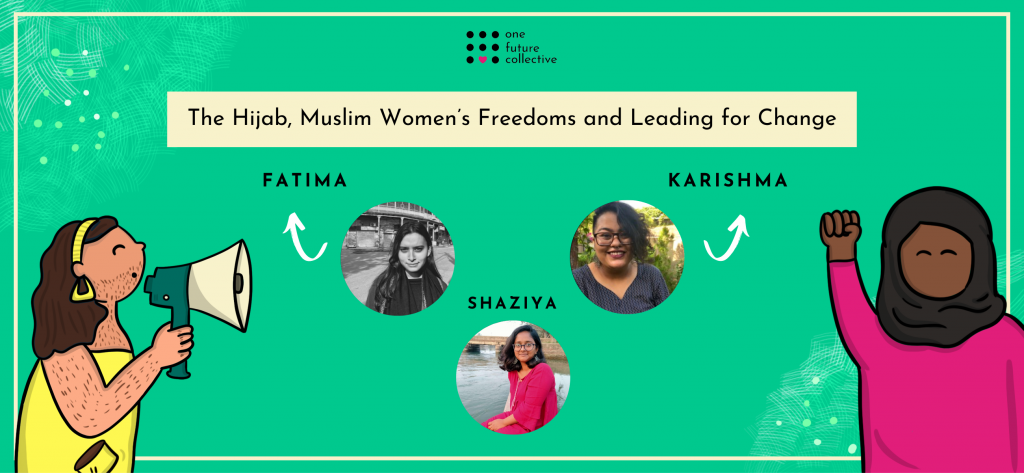On 17th February 2022, One Future Collective hosted a live on the theme “The Hijab, Muslim Women’s Freedom and Leading for Change”, where Karishma Shafi, Senior Program Officer at One Future Collective acted as the Moderator and was joined by Shaziya Shaikh, communications professional, a writer, and a creative facilitator and Fatima Juned, Research Associate at a policy think tank based in Delhi. The conversation navigated through the everyday experiences of people with intersectional identities through the lens of Muslim womxn. Especially what happens to the everydayness of marginalization in the face of extraordinary violence.
Karishma started the conversation by talking about how we view minorities through pigeonholes, where each identity has a separate hole. Being a woman and being Muslim are viewed separately, instead of looking at their overlap in life. They set the tone of the conversation to focus on the intersectionality of these identities. Shaziya points out how intersectionality appears in layers in her daily life, as more layers keep adding, it becomes more restrictive. There’s a layer of being a woman, another of being a Muslim woman, and then another of being a queer Muslim woman.
The conversation delved into how Muslims are perennially aware of their appearance in public- a decision on how ‘Muslim’ they want to look in public is made every day, now more than ever. The Hijab row has come to affect the entire community – an act of extremism under the guise of protection. Structural violence creates unequal spaces within the community. Karishma says, ‘I fear presenting this identity because my words will be challenged.’
The panellists discussed how targeting Muslims is no new event in this current regime – The hijab row is one among many but with grave repercussions. For those working in the development sector, it is going to become harder convincing Muslim women of their basic rights. The sights publicized from the last few weeks will have an indelible impact. A Muslim girl stopped from entering an educational institution will make others correlate hijab with denial and violence.
They point out the importance of showing solidarity for those who exist in able spaces and for Muslims to celebrate their identity and whatever form it takes. On some days it’s basking in Muslim joy and on others, it’s collecting petitions and wearing your hijab proudly.
The Idea of the hijab, they discuss, may have patriarchal roots but ideally must be a choice one makes as an adult, that the hijab has numerous cultural embeddings.
They highlight the importance of knowing your constitutional right. Education is one way to bridge that gap. As are more conversations around the current intolerance and countering it. ‘If we don’t counter out of fear, then it will keep happening. They will feel whatever they say is correct’, says Fatima.
The panels agree that the most effective way to combat hate and othering is to include more people and what their experiences are in their day to day life. Forming safe communities is monumental- not just a Muslim community but with others. This way the focus is not primarily on differences.
Instagram link: https://www.instagram.com/p/CaFXNw8PIqI/
